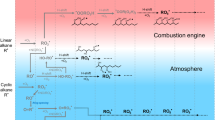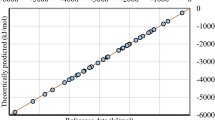Abstract
MESSRS. NEUMANN and Aivazov direct attention1 to the negative temperature coefficient of the combustion of hydrocarbon mixtures under certain conditions; this phenomenon, which has also been referred to by Pease2 and by Beatty and Edgar3, seems well established. The explanation given in the letter is a formal presentation of the views which have been put forward in various communications dealing with hydrocarbon combustion, the peroxide theory and knock in engines. The step A B is the normal process whereby the hydrocarbon is oxidised to aldehyde.
This is a preview of subscription content, access via your institution
Access options
Subscribe to this journal
Receive 51 print issues and online access
$199.00 per year
only $3.90 per issue
Buy this article
- Purchase on Springer Link
- Instant access to full article PDF
Prices may be subject to local taxes which are calculated during checkout
Similar content being viewed by others
References
NATURE, 135, 655, April 27, 1935.
J. Amer. Chem. Soc., 1929 and 1934.
J. Amer. Chem. Soc., 56, 102; 1934.
Author information
Authors and Affiliations
Rights and permissions
About this article
Cite this article
EGERTON, A., UBBELOHDE, A. Critical Phenomena in the Oxidation and Self-Inflammation of Hydrocarbons. Nature 135, 997–998 (1935). https://doi.org/10.1038/135997b0
Published:
Issue Date:
DOI: https://doi.org/10.1038/135997b0
Comments
By submitting a comment you agree to abide by our Terms and Community Guidelines. If you find something abusive or that does not comply with our terms or guidelines please flag it as inappropriate.



